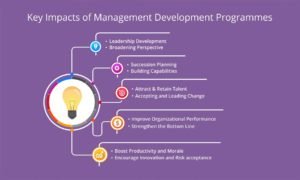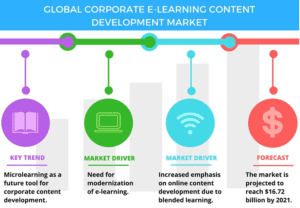Last updated on March 29th, 2024 at 09:33 am
Why are management development programs competitive differentiators in 2022?
The role and importance of personnel training have never been sufficiently acknowledge d. This seems set to change.
d. This seems set to change.
Increasingly, employees value the avenues for Learning and Development (L&D) provided in an organization to be a key factor in their choice of a business to work for.
The competition for top talent is intense and is set to heat up further. A recent study found that in 2022 and onwards, L&D and management development programs are set to provide businesses with competitive differentiation across industry sectors.
The key findings of the study include:
- A majority (67%) of HR teams have been provided with an enhanced L&D budget in 2022
- Nearly half (46%) of businesses have specific training programs for fresh inductees
- A significant majority (77%) of HR managers plan to pursue life skills training within the next year
- 42% of HR managers plan to run customized programs for the re-entry of former employees
The findings of the study, specific to employees, include:
- There is a high level of satisfaction (75%) among employees about L&D programs in their organizations
- More employees(76%) are likely to continue in organizations that offer opportunities for continuous learning
- Many(55%) employees felt that additional training would help them improve their performance
- 38% of employees opined that training needs to be aligned with the responsibilities of their roles
- Nearly half the employees, in addition to workplace training, nearly half the employees also pursued training through outside agencies
It is quite evident from the study findings that corporate learning and development programs are slowly gaining their deserved place in the spotlight. The availability of management development programs is a key benefit sought by current and prospective employees. Management development programs provide competitive differentiation, and this trend is poised to gain further momentum.
Personalization of L&D
Modern workplaces are global and are characterized by diversity in races, genders, religions, regions, sexual orientations, etc. A cookie-cutter approach to training would not work in such circumstances. For example, if an online sales training course were to be conducted. In that case, the millennials and Gen-Z might be comfortable with digital tools for delivering training, but the older lot might feel intimidated. Progressive organizations recognize this and are personalizing training based on the generation to which the employees belong.
Impact on Retention
According to the above study, most employees (76%) said that learning opportunities would motivate them to continue working for the organization. Training benefits the organization because trained employees with higher skill levels will deliver superior work. Training also benefits the employees by elevating their professional standing due to their enhanced skill level resulting from workplace training.
Increased Effectiveness
For training to be effective, it needs to be relevant to the employee’s role, needs continual updates, the curriculum developed needs to incorporate employee inputs, and should be broken into shorter sessions.
When employees have a say in the curriculum, training is not delivered just to tick some boxes. Allowing employee participation signals that the organization truly cares for the employees’ opinions. As the study found, if the employees perceive training to be ineffective, they will seek training outside the organization, which could adversely impact retention.
Final Thoughts
Increasingly, businesses are partnering with specialized L&D service providers such as Imarticus Learning. Such partnerships provide cost savings, increased efficiency, and a significant competitive advantage.
 Imarticus has trained, through its corporate leadership development programs, over 35,000 professionals from leading firms such as IBM, KPMG, Genpact, Moody’s Analytics, Motilal Oswal, etc., to name a few.
Imarticus has trained, through its corporate leadership development programs, over 35,000 professionals from leading firms such as IBM, KPMG, Genpact, Moody’s Analytics, Motilal Oswal, etc., to name a few.
Managed learning services partnerships are on the rise. Such specialized services help businesses stay current with the developments in their industry and gain a competitive edge in today’s hyper-competitive business environment.

